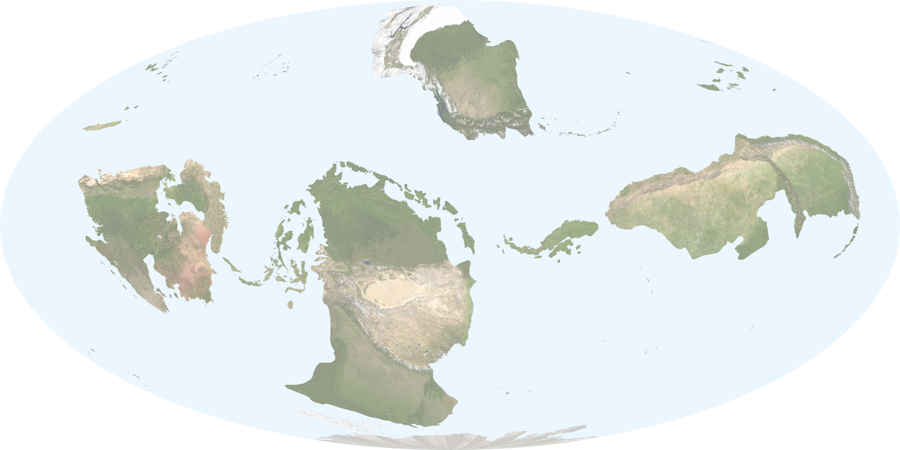Uhartea: Alternative World Project
Geographic Speculation and Worldbuilding
Medium: Worldbuilding and Geographic Design
Status: Ongoing Development
Original Purpose: TTRPG setting, but adaptable to other projects
Themes: Geographic effects on social history, world systems theory, alternative history, social development
The World of Uhartea

The world of Uhartea, showing the distinctive “four bay island” continental structure that gives the world its name.
Project Description
Uhartea is a comprehensive worldbuilding project exploring how geographic and climatic factors influence social, economic, and political development. What began as a fantasy world for tabletop gaming has evolved into a sophisticated exploration of world systems theory and alternative historical trajectories.
The name “Uhartea” derives from the Basque word for “island” (singular absolutive), reflecting the project’s focus on a “four bay island” continent as the central geographic feature visible in the map above.
Academic Connections
This creative project has become a laboratory for exploring ideas from my academic research:
- Geographic Influences on Society: How do different landmass configurations, climate patterns, and resource distributions shape social development?
- World Systems Theory: Examining how core-periphery relationships might develop under alternative geographic constraints
- Conflict and Cooperation: Exploring how geography influences patterns of trade, alliance, and conflict between societies
- Social Development: Investigating how environmental factors affect technological advancement, political structures, and cultural evolution
Worldbuilding Components
The project encompasses multiple interconnected elements:
Geography and Environment
- Continental structure and landmass arrangements
- Climate zones and weather patterns
- Resource distribution and environmental constraints
- Trade routes and natural barriers
Societies and Cultures
- Political structures emerging from geographic realities
- Economic systems shaped by resource availability
- Cultural development influenced by environmental factors
- Technological advancement paths determined by materials and needs
Historical Development
- Alternative timelines and historical trajectories
- How geographic factors influence major historical events
- Development of trade networks and political alliances
- Patterns of conflict and cooperation over time
Systematic Elements
- Cosmological and metaphysical frameworks
- Unique creatures and ecosystems
- Magical or technological systems
- Adventure hooks and narrative possibilities
Research Integration
This worldbuilding project serves as applied research in several ways:
Geographic Determinism: Testing how different physical environments might produce alternative social arrangements, complementing academic work on how structural conditions influence conflict and cooperation.
Comparative Social Development: Creating controlled conditions to explore how societies might develop differently under alternative constraints, similar to comparative historical analysis in sociology.
Systems Thinking: Developing complex, interconnected social systems that respond to environmental pressures, practicing the kind of systems analysis useful in conflict and violence research.
Future Development
The project continues to evolve as both creative work and intellectual exercise:
- Detailed Regional Development: Creating specific societies with their own political structures, economies, and cultures
- Historical Narratives: Developing timelines that show how geographic factors influenced major developments
- Game/Story Applications: Testing the world through actual gameplay or narrative development
- Academic Applications: Using insights from worldbuilding to inform research on real-world geographic influences on social development
Methodology
The worldbuilding process combines:
- Geographic Realism: Ensuring physical systems (climate, geology, ecology) operate according to realistic principles
- Social Scientific Thinking: Applying theories from sociology, political science, and economics to society development
- Historical Analysis: Drawing on real-world examples of how geography influenced historical development
- Creative Exploration: Imagining novel solutions to geographic and social challenges
Uhartea represents an ongoing exploration of how creative worldbuilding can serve as a laboratory for testing ideas about social development, geographic influence, and alternative historical possibilities.